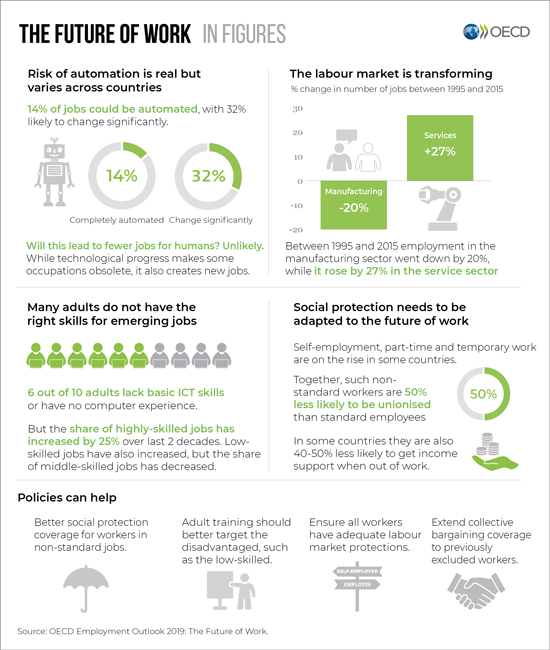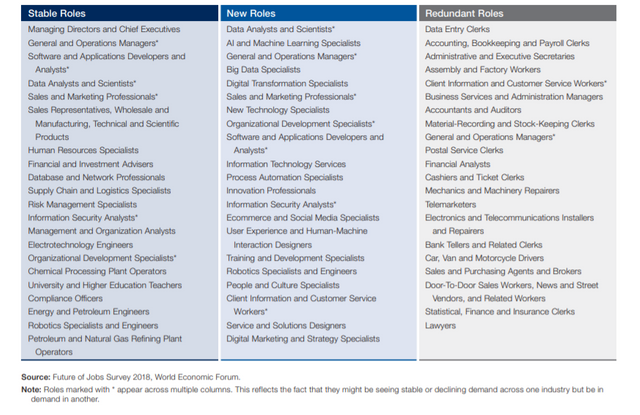Who survives the age of digitization? Hopefully we get the time to adjust.


A glance at history shows that we are well on the way to making ourselves redundant. The 19th century is the time of mechanization. Human muscle power then was replaced by mechanical steam power. In the textile industry, people and the loom made way for weaving machines.
In the 20th century, machines were able to perform increasingly complex tasks. Robots in car factories assemble the parts in a production line almost devoid of humans. People stand by in the role of quality controller.
After the time of robotization, a new era of digitization begins in the 21st century. After our body, the machine now takes over more and more tasks that require the intervention of our brain. For example, in the banking sector and at train stations, counter clerks have made way for vending machines.
Developments are going faster and faster and Go masters are throwing in the towel because computers can no longer be beaten. Who knows, we may be driving in self-driving cars soon, just as pilots have been relying on autopilot for some time. Drones deliver packages and robots take care of the elderly.
The main reasons for replacing humans with machines are greater efficiency, productivity gains, and cost reductions. A machine can work continuously for longer, is never sick and can quickly produce large quantities without defect. Machines are cheaper than people and will become increasingly cheaper over the years, which means that the price of products can fall. They have relieved us of much monotonous and heavy work and the productivity gains achieved with them have led to an increase in leisure time and higher wages.
We still have jobs?
Computers, networks, and computer science are becoming more and more important, which means that jobs demand more and more knowledge in those areas. The question is what this means for the quantity and quality of work. Does digitization mean that everyone stays in work or will there be an excessive expulsion of labor? Whichever way we turn, it's a fact that the starting point is that digitization leads to productivity growth so far fewer people are needed to produce the same. Exactly the same thing happened with agriculture.
Examples of stable, new and redundant roles, all industries. Source: Future of Jobs Survey 2018, World Economic Forum.
Most studies (see links below) expect millions of jobs to disappear in the coming years, particularly middle and low-skilled administrative jobs. In recent years, tens of thousands of jobs have been lost in the banking and services sector. The same goes for the distribution sector: the retail trade is disappearing now that we are increasingly buying in web stores. Many stores are making way for a few distribution centers that deliver packages by vans.
Comparing skills demand, 2018 vs. 2022, top ten. Source: : Future of Jobs Survey 2018, World Economic Forum.
A job that has been taken over by a computer is never done by a person again. That is a matter of digital Darwinism. There will mainly be jobs in highly skilled sectors such as IT and professional services. So we can expect a shift from low-skilled to high-skilled work, which will also change the quality of the work. More use will be made of IT knowledge, of abstract and creative abilities.
Work then becomes a privilege: a fairly limited number of jobs that's not for everyone. In The Rise of the Robots(2015), futurist Martin Ford even expects a minority to be at work and advocates a basic income for everyone. The majority of this "society" can stay at home, go fishing or play games. For some perhaps a dream or a utopia, certainly for those who find their work meaningless. For others a nightmare of boredom and loss of meaning.
But isn't it absurd that we wouldn't know how to deal with our free life that we expect a solution from employers?

What can we do?
The impact of digitization is difficult to estimate and we cannot do much about it. It is a global process that a country cannot avoid. We can, however, make political and social choices, for example for a basic income or a shorter working week. Most of the current politicians talk and complain about the unsustainable nature of such proposals, but I'm afraid social reality will sooner or later catch up with them.
For some sectors, people will remain crucial, such as in social, caring, creative and scientific professions. Others will have to refocus on a different job content or even a totally different profession.
That new job may be an extension of the previous one. New jobs often arise in the side stream in addition to the digitized mainstream. An accountant sees his job threatened now that invoices and calculations are processed automatically. What can he do?
- He can concentrate on checking the transactions because no matter how well a machine works, our confidence in technology is not unlimited.
- Or he can focus on specific parts of the accounting that have not been digitized yet.
- He may also be able to contribute to the development of software that is needed to improve the accounting program.
New jobs are also created because IT and technicians need support staff for their digitization projects. Many large projects, deadlines and training courses might also mean greater use of childcare, household help, and meals eaten out of home. Whichever choice our bookkeeper makes, he cannot simply start his new job. He doesn’t have the knowledge and experience.

Source: OECD Employment Outlook 2019: The Future of Work
Both knowledge and behavior will have to change
One thing is certain: digitization has consequences not only for the required knowledge of employees but especially for the necessary competences. We will have to concentrate on what the computer cannot do: adding context to the knowledge and be able to creatively solve any challenge you come up against. It is not so much about people having to master new software programs, but that work processes will run differently and that the organization of work will change. Work will be done on a project basis. Results will be more important than attendance. The cloud eases remote working or working from home. Teams will be self-managing and there will be less hierarchy.
Not everyone is able to function in such a flexible environment because the familiar routine is turned upside down. Both knowledge and behavior will have to change. And this adjustment process doesn’t stop. You will no longer learn for a diploma. As never before, the keyword will be lifelong learning. But there are also limits to our capacity to learn. So a lot will depend on whether we get the time to adjust.
Only time will tell.

Sources and references:
- Main photo by Marvin Meyer on Unsplash
- Go master quits because AI 'cannot be defeated'
- Digital Darwinism: How Disruptive Technology Is Changing Business for Good
- The Future of Jobs Report 2018
- OECD: Data on the future of work
- Book: Rise of the Robots: Technology and the Threat of a Jobless Future
- Rise of the robots: An interview with Martin Ford


Nice Posts.